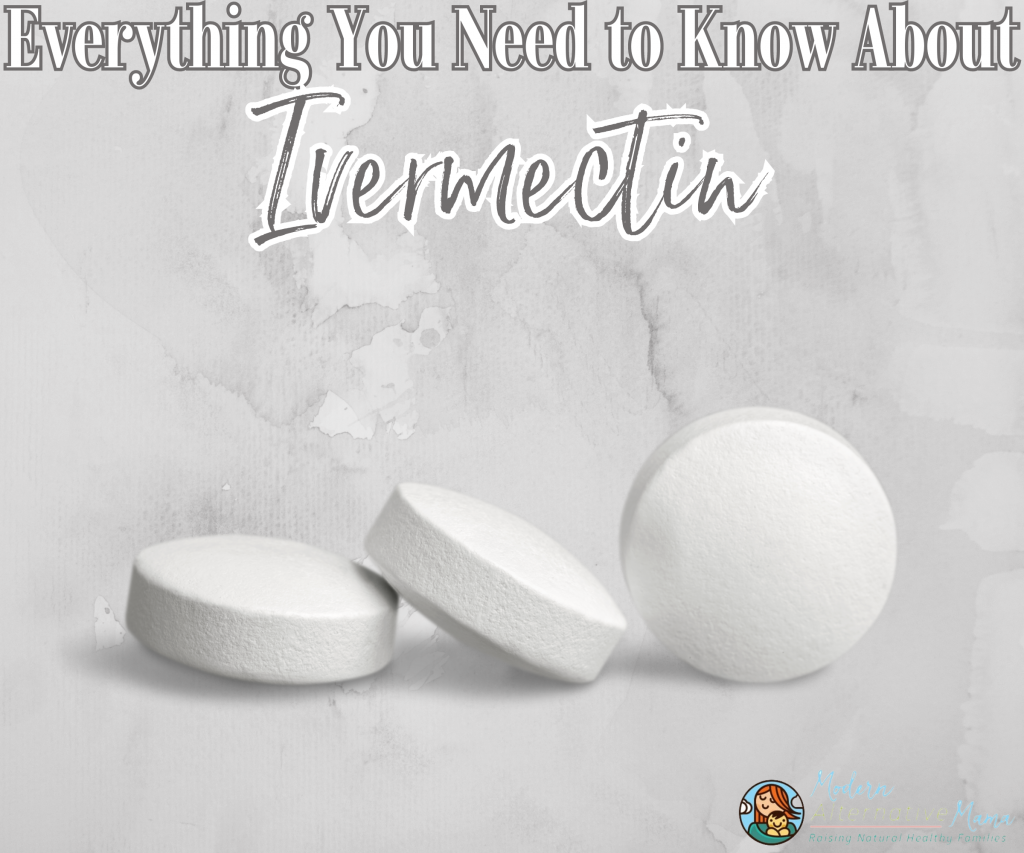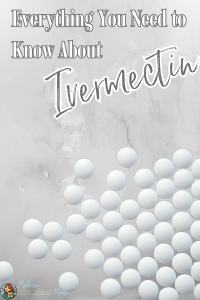Ivermectin. That is one medication I am tired of hearing about. At the peak of covid, so many people recommended stocking up on ivermectin, just in case. It blew my mind how many natural enthusiasts recommended a pharmaceutical medication.
I think much of this need for ivermectin stemmed simply because the mainstream said it didn’t work. As someone who is anti-mainstream, that type of claim is NOT evidence that they actually work, especially for something like covid. Of course, there may be evidence of it working in extreme cases, but Ivermectin shouldn’t be anyone’s first line of defense for an illness, especially when safer options like herbs exist.
Covid aside (because, let’s face it, we’re all over covid talk by now), many people use Ivermectin for its intended purpose – parasites. So let’s discuss it.
What is Ivermectin?
There are several types of Ivermectin, which seemed to cause a lot of confusion for people in 2020. Oral Ivermectin is approved for human use to treat infections like Strongyloidiasis and Onchocerciasis caused by parasitic worms. A topical version of Ivermectin may be prescribed for head lice and skin conditions like rosacea. Like most pharmaceuticals, there is also an animal-safe version, which helps prevent heartworm disease and certain parasites (1).
Remember that taking a drug meant for a large animal like a horse or cow is dangerous. These larger animals weigh up to 15x more than the average adult (2,000 pounds). Additionally, many drugs intended for animal consumption have inactive ingredients that aren’t safe for humans.
Risks of Ivermectin
Like all pharmaceuticals, Ivermectin has side effects. Just because the mainstream does not recommend it, it doesn’t take away its potential to cause detrimental side effects.
Oral Ivermectin
Remember how I spoke about inactive ingredients in drugs intended for animal consumption? Well, this is a problem for human consumption too. For instance, oral Ivermectin (for humans) contains the following inactive ingredients: colloidal silicon dioxide, croscarmellose sodium, magnesium stearate, microcrystalline cellulose, and pregelatinized starch (2).
Potential side effects of oral Ivermectin are (3):
- Eye pain or redness, puffy eyes, problems with your vision
- Severe skin rash, itching, or rash with pus
- Confusion, change in your mental status,
- Balance problems, trouble walking
- Fever
- Swollen glands
- Stomach pain
- Joint pain
- Swelling in your hands or feet
- Fast heart rate
- Trouble breathing
- Loss of bladder or bowel control
- Neck or back pain
- Seizures (convulsions)
- A light-headed feeling, like you might pass out
- Headache
- Muscle aches
- Dizziness
- Nausea
- Diarrhea
- Mild skin rash
Topical Ivermectin
Topical ivermectin contains the following inactive ingredients: benzyl alcohol, citric acid anhydrous, carbomer homopolymer type c, di-isopropyl adipate, edetate disodium, hexylene glycol, methylparaben, oleyl alcohol, polysorbate 80, propylparaben, purified water, sodium citrate, sodium hydroxide, and sorbitan tristearate (4).
Potential side effects of topical ivermectin (5):
- Burning, itching, redness, or stinging of the skin
- Burning, dry, or itching eyes
- Dandruff
- Discharge or excessive tearing
- Dry skin
- Redness, pain, or swelling of the eye, eyelid, or inner lining of the eyelid
- Burning sensation
- Skin irritation, pruritus, dry skin
- Erythema
- Contact dermatitis
- Muscle strain
- Back pain
- Headache
- Nasopharyngitis
- Upper respiratory tract infection
- Sinusitis
- Seasonal allergy
- Conjunctivitis
- Ocular hyperemia
- Eye irritation
- Urinary tract infection
I recognize there has been success using Ivermectin in severe cases of covid. Still, these success stories have led many to think that Ivermectin is their only fighting chance at survival. People have forgotten that herbs exist with the same benefits and much less potential for side effects, so let’s talk about them.
Herbs with Antiparasitic Properties
An antiparasitic property is when a substance can kill, repel, or remove parasites (6). A form of antiparasitic is anthelmintic, meaning a substance that can destroy parasitic worms, like ivermectin (7). When most people think of antiparasitic herbs, what comes to mind are wormwood and black walnut. Although these two herbs are amazing antiparasitics, they’re a bit harsh for children, so I wanted to share herbs everyone can use. My recommendations include the following:
Calendula
Thanks to its antibacterial, antiviral, antifungal, and wound-healing properties, calendula has been used internally and topically for centuries to heal wounds, burns, and rashes. Some of these properties are why calendula is also a great antiparasitic. In an older study, calendula inhibited the development of L3 Heligmosomoides polygyrus larvae (8). A more recent study also found calendula affects the characteristics of Heligmosomoides polygyrus bakeri L3 proteins (9).
Clove
Clove is probably most popular for its ability to soothe mouth pain, but it’s so much more than that. Clove has both insecticidal and anthelmintic properties. Due to clove’s antibacterial, antifungal, and insecticidal properties, its often used as a pesticide and fungicide in drugs and cosmetics (10).
Of course, you’re not here for the insecticidal properties but for the anthelmintic properties. In studies, clove flower oil demonstrated anthelmintic activity (11). For example, in animal studies, clove decreased the number of excreted nematode eggs per gram of feces by an average of 40.6% in naturally infected ewes in farm conditions (12).
Coconut Oil
Although coconut oil is not an herb, I felt this needed to be discussed since it’s easily accessible in almost any supermarket. In studies, the overall coconut plant inhibited the growth of parasites responsible for the most deadly form of human malaria, P. falciparum, to at least half that of the controls (13). These benefits likely stem from their medium-chain, saturated fatty acids (MCSFAs) content, which possesses both antimicrobial and antiparasitic properties (14).
Garlic
Garlic is probably one of the most commonly used cooking spices and happens to be antiparasitic. One study found garlic to kill the copepod parasite L. kroyeri obtained from European sea bass (15). Other studies confirm that the sulfur-containing compounds in garlic effectively kill parasites like Trypanosoma brucei trypanothione reductase and Leishmania tarentolae (16).
Pumpkin Seed
Pumpkin seeds are often roasted and enjoyed as a snack, but they also have health benefits like destroying parasitic worms. Several human and animal studies have demonstrated pumpkin seeds possess anthelmintic properties (17,18,19). One study concluded that naturally-occurring compounds in plants, like pumpkin seeds, constitute an alternative to synthetic anthelmintics (20). In the previous ewe clove study, pumpkin seed was also tested and performed better, with a 52.9% average decrease of excreted nematode eggs per gram of feces (12).
I end this with a word of advice: Choose herbs over pharmaceuticals whenever you can. Don’t be so anti-mainstream that you’re led astray by advice that is NOT actually natural!








You distract from your valid reasons to avoid this drug when stating, “Remember that taking a drug meant for a large animal like a horse or cow is dangerous. …,” which is the same irrelevant and irresponsible tactic MSM uses to discredit it, and is misleading, at best. Ivermectin has been successfully used by humans for decades (note, I’m not claiming there aren’t side effects). Further, dosage is by weight, so humans aren’t taking the same amount as a horse. People may choose to use natural remedies instead of this drug, but it should be for valid reasons, not false comparisons.
Thank you for your thoughts on the topic. This post discusses the approval of ivermectin for human use in the paragraph before the highlighted quote. Although not everyone is taking ivermectin designed for animals, it has happened, and it needs to be discussed for those who may not be aware of the risks (just like how animals shouldn’t have drugs designed for humans). At the end of the day, ivermectin isn’t natural, so we do not advocate for it, which is why we shared safer herbal alternatives.
How can I find out the dosage of these herbs to take? For covid? Also for other things that may come up? Thank you